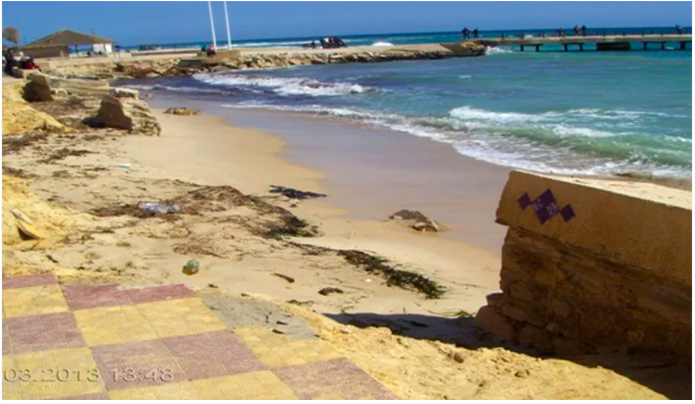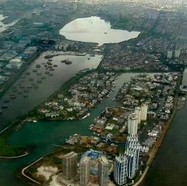
According to a World Bank report published as early as 2021, entitled « Endangered coasts in the Maghreb: coastal erosion and its costs », Tunisia is the Maghreb country with the highest erosion rate in the region.
Tunisia’s coastline, once renowned for its breathtaking beauty and pristine beaches, is facing alarming degradation. Pollution and coastal erosion threaten not only the environment, but also the national economy and cultural heritage.
With its coastline, 575 kilometers of sandy beaches and string of heavenly islands, Tunisia is one of the Mediterranean’s most popular destinations for seaside vacations. In fact, the tourism sector is built around this seaside model. For locals and visitors alike, Tunisia puts the spotlight on its so-called paradise beaches. But the reality is quite different. The President of the Republic, who travels from time to time to closely monitor the situation on Tunisia’s beaches, has made the following observation: the coastline is deteriorating day by day, depriving Tunisians of their beaches.
Recently, the Head of State paid a visit to the town of Hammam-Lif, in the governorate of Ben Arous, where he expressed his dissatisfaction with the catastrophic ecological situation of the local beach and « the dilapidated state of certain monuments ». He also denounced « a murder of the entire Tunisian coastline » and an « operation to destroy the State in all areas ». « The means were inferior, but the situation was better in the past », he denounced. « Their project is to destroy citizens’ trust in power. They talk about global warming… corruption exists at sea and on land », the President of the Republic railed.
Erosion, the number one threat!
Insecurity, pollution and erosion – our beaches are under increasing threat. For some locals, it’s become almost impossible to cool off on these scorching days. Only this time, the authorities’ response was immediate. Last Saturday, the maritime districts and regional units of the National Guard carried out a vast joint security campaign targeting the entire coastal strip to clean up the coastline and provide a healthy environment for local and foreign holidaymakers.
The General Directorate of the National Guard said in a statement that Sea Guard units are stepping up their efforts during the summer to ensure the safety of citizens and visitors. These efforts include the deployment of regular patrols along the coast, the installation of strategic checkpoints and the inspection of marine craft to verify the validity of licenses and equipment. The units also monitor compliance with maritime laws, safety standards and health regulations. They also combat pollution.
But far from these occasional campaigns, the coastline is actually threatened by erosion, which is progressing at an alarming rate. Unregulated construction, excessive sand extraction and climate change are all factors accelerating coastal erosion. Many coastal villages and archaeological sites are in danger of disappearing beneath the waters, taking with them a part of the country’s history and heritage. As you will no doubt have noticed, many beaches are beginning to lose their depth, invaded by rising sea levels due to global warming.
Biodiversity also under threat
In Tunisia, experts estimate that certain coastal zones could retreat by several meters every year if drastic measures are not taken. Climate change and violent natural phenomena combined with rising sea levels are exacerbating this already critical situation, also caused by urban expansion.
Mohamed Adel Hentati, an environmental and sustainable development expert, tells La Presse that marine erosion is one of the greatest threats to the coastline. Indeed, rising sea levels have caused beaches to retreat, with some retreating by one to one-and-a-half meters a year – a high rate, in his view.
Asked about the causes of this worrying situation, he explains that « although the techniques used to combat this phenomenon are very costly, they have unfortunately not succeeded in stopping it, only in partially slowing it down ».
The expert attributes the worsening of this phenomenon also to the concentration of tourist infrastructures, such as hotels and cafés, directly on the coast, thus preventing the sand from regenerating, but also to the absence of a national strategy to combat maritime erosion. Tunisian beaches, which attract millions of tourists every year, are invaded by plastic waste, sewage and other industrial pollutants. This pollution endangers marine biodiversity and public health. Marine species that were once abundant are now in decline, affecting local fisheries and the marine ecosystem.
According to Hentati, the other major threat to Tunisian beaches and the entire maritime domain is pollution, in particular industrial water discharged into the wadis in a haphazard manner, without treatment or with two-stage treatment that does not meet world standards. This water is discharged directly into the sea, which has seriously damaged the marine environment, particularly on coasts close to industrial zones such as Ben Arous, Bizerte and Gabès, » analyses our interlocutor.
Water buffer zones
« The State must face up to this situation by paying close attention to beaches and the coastline in general, as it is doing to combat the water shortage that Tunisia is suffering from. The threat to the coastline is equally serious and weighs heavily on the tourist economy. It is therefore necessary to identify the sources of pollution, particularly from polluting industries, and to take rapid and bold measures to reduce the rate of this pollution », he advocated.
He also asserted that protecting Tunisia’s coasts is a collective responsibility, all the more so as they are threatened by erosion and the increase in certain natural phenomena against a backdrop of climate change, which is having a global negative impact.
To this end, he suggests tightening up existing regulations on the discharge of industrial and domestic waste into the marine environment, and imposing severe penalties for environmental offences to deter polluters. It is therefore essential to establish buffer zones along the coast where all construction is prohibited, in order to reduce the impact of erosion in the long term.
Source: LaPresse.tn



